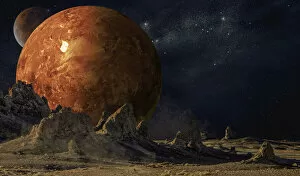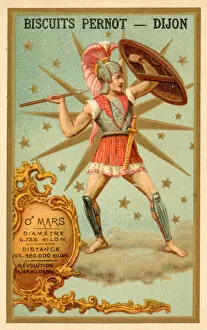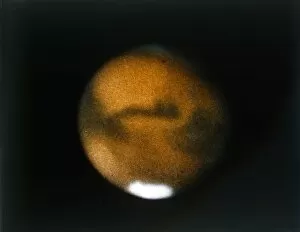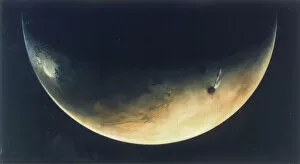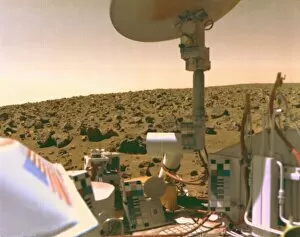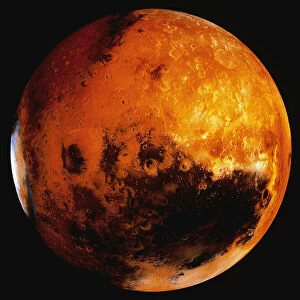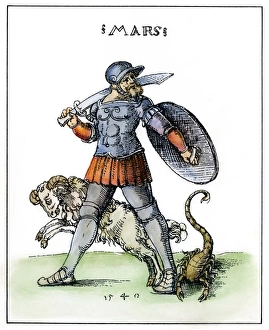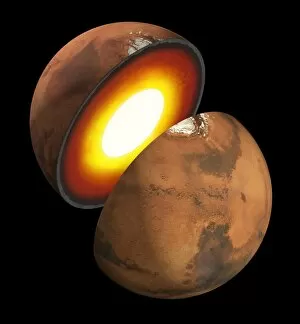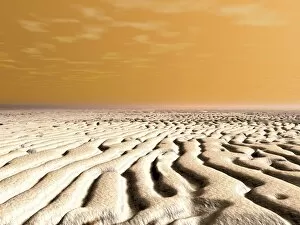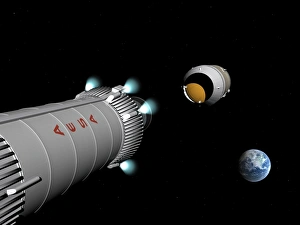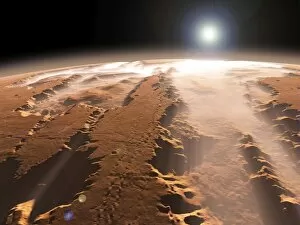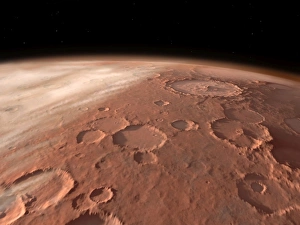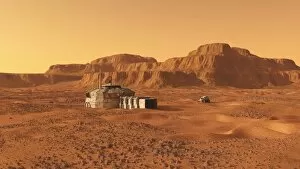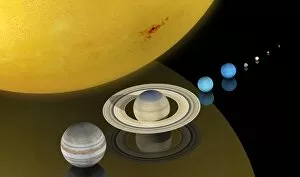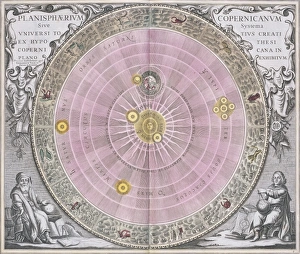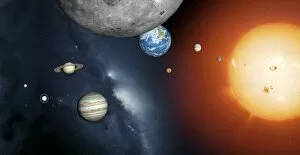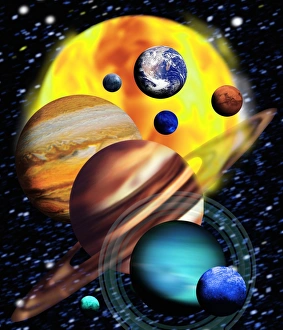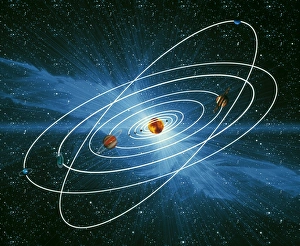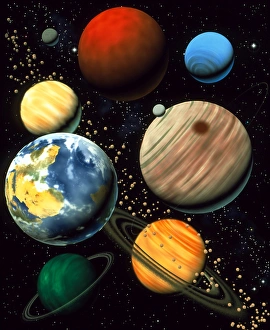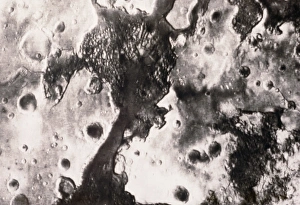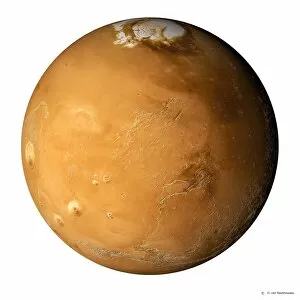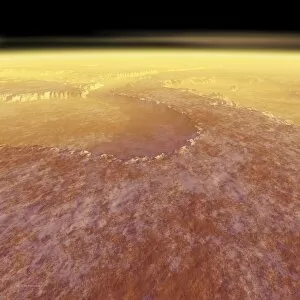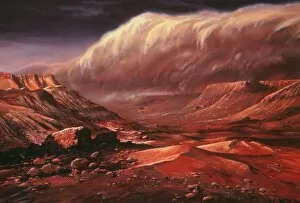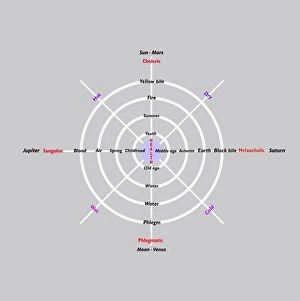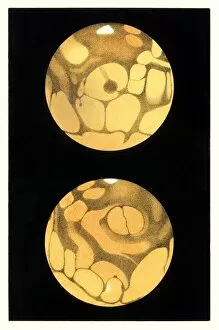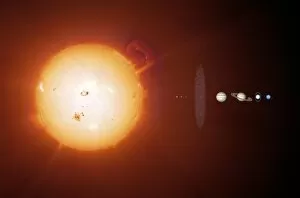Mars Collection (page 6)
Mars is the fourth planet from the Sun and the second-smallest planet in our Solar System and has a reddish hue due to its iron oxide-rich surface
1,054 items
All Professionally Made to Order for Quick Shipping
-
Mars Collection
Mars is the fourth planet from the Sun and the second-smallest planet in our Solar System and has a reddish hue due to its iron oxide-rich surface, which gives it its nickname "the Red Planet". Mars has two moons, Phobos and Deimos, which were discovered in 1877 by Asaph Hall. The atmosphere is mostly carbon dioxide with traces of nitrogen and argon. Its surface features include volcanoes, canyons, craters, and polar ice caps. Scientists believe that Mars may have once had an ocean on its surface billions of years ago. With recent advances in space exploration technology, scientists are now able to study Mars more closely than ever before using robotic rovers such as Curiosity and Perseverance. These rovers have revealed many interesting facts about the planet's geology and climate that could help us better understand our own planet Earth.
+
Our beautiful pictures are available as Framed Prints, Photos, Wall Art and Photo Gifts
The Mars collection from Media Storehouse offers a range of high-quality wall art, framed prints, photo prints, canvas prints, jigsaw puzzles and greeting cards that showcase the beauty and mystery of the Red Planet. Our collection features stunning images captured by NASA's various missions to Mars over the years. These include breathtaking landscapes of Martian valleys, craters and mountains as well as close-up shots of its rocky terrain and swirling dust storms. Whether you're an astronomy enthusiast or simply fascinated by space exploration science, our collection is sure to inspire wonder and curiosity about our neighboring planet. With a variety of sizes and formats available for each image in the collection, it's easy to find something that fits your personal style or decor preferences. Perfect for home or office display or as a unique gift for someone special who shares your love for all things space-related.
+
What are Mars (Planets Space Exploration Science) art prints?
Mars art prints are high-quality reproductions of stunning images captured by NASA's Mars missions. These prints showcase the beauty and mystery of the Red Planet, featuring breathtaking landscapes, towering mountains, deep canyons, and other fascinating geological features. These art prints are perfect for space enthusiasts or anyone who appreciates the wonders of our solar system. They make great additions to home decor or office spaces, adding a touch of science and inspiration to any room. We offer a wide selection of Mars art prints in various sizes and formats, including framed or unframed options. Each print is carefully produced using archival materials to ensure long-lasting quality and vibrant colors. Whether you're looking for a unique gift or simply want to decorate your own space with stunning imagery from one of humanity's greatest achievements in exploration, Mars art prints from Media Storehouse are an excellent choice.
+
What Mars (Planets Space Exploration Science) art prints can I buy from Media Storehouse?
We offer a wide range of Mars art prints that are perfect for space enthusiasts and collectors alike. You can choose from stunning images captured by NASA's rovers, including panoramic views of the planet's surface and close-up shots of its rocky terrain. These high-quality prints showcase the beauty and mystery of Mars in vivid detail, allowing you to explore its unique landscapes from the comfort of your own home. In addition to NASA imagery, Media Storehouse also offers artistic interpretations of Mars created by talented photographers and artists. From abstract paintings to detailed illustrations, these prints offer a fresh perspective on our neighboring planet and make great conversation starters for any space-themed room or office. Whether you're looking for scientific accuracy or creative expression, we have something for everyone when it comes to Mars art prints. So why not add one (or more.) to your collection today?
+
How do I buy Mars (Planets Space Exploration Science) art prints?
To purchase Mars art prints from Media Storehouse, you can browse our online gallery of images and select the ones that catch your eye. Once you have made your selection, simply add them to your cart and proceed to checkout. You will be prompted to enter your shipping and payment information before finalizing the transaction. We offer a wide range of print options including canvas, framed, mounted or poster prints in various sizes. We also offer customization options such as choosing a specific frame or matting for your print. Our collection features stunning imagery captured by NASA's Mars rovers and other space exploration missions. These high-quality prints are perfect for anyone interested in astronomy or space exploration. Purchasing Mars art prints from Media Storehouse is a simple process that allows you to bring the beauty of outer space into your home or office.
+
How much do Mars (Planets Space Exploration Science) art prints cost?
We offer a wide range of Mars art prints at varying prices. The cost of the art prints depends on factors such as the size, quality, and type of print selected. You can choose from a variety of options including canvas prints, framed prints, photographic prints and more. The price range for these art prints is designed to cater to different budgets and preferences. Whether you are looking for an affordable option or a high-end piece that will make a statement in your home or office space, we have something for everyone. The cost of Mars art prints varies depending on individual preferences and specific requirements. However, you can rest assured that they will find great value for their money when shopping with Media Storehouse.
+
How will my Mars (Planets Space Exploration Science) art prints be delivered to me?
We take great care in delivering your Mars art prints to you. We use high-quality packaging materials to ensure that your prints arrive in perfect condition. Your print will be carefully rolled and placed inside a sturdy cardboard tube for protection during transit. We work with trusted delivery partners who provide reliable and efficient shipping services worldwide. Depending on your location, the delivery time may vary but rest assured that we will keep you informed every step of the way. Once your order has been dispatched, you will receive an email notification containing tracking information so that you can track the progress of your shipment online. We are committed to providing our customers with exceptional service and quality products. If for any reason you are not satisfied with your purchase or have any questions about our delivery process, please do not hesitate to contact us.

